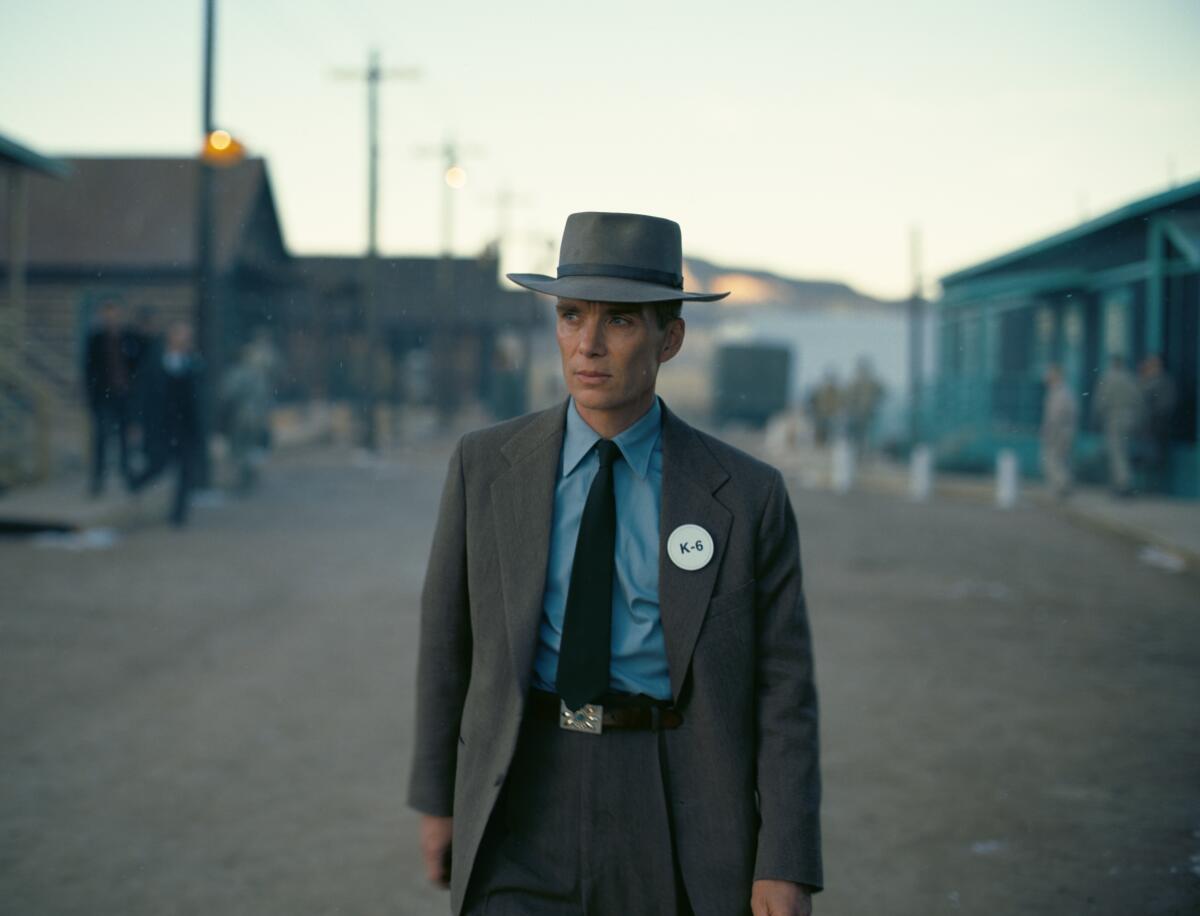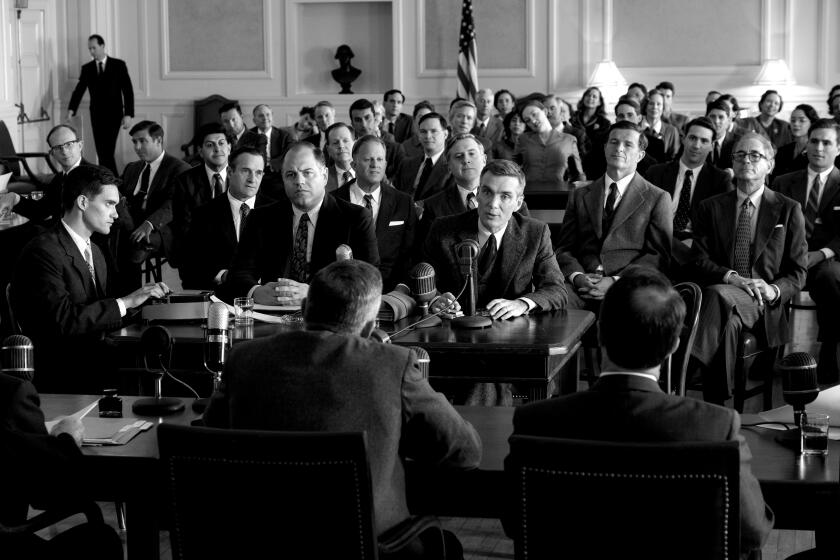Opinion: ‘Oppenheimer’ is here. Is Hollywood still afraid of the truth about the atomic bomb?

- Share via
In 1945, Hollywood set in motion its first big-budget movie drama about the making and use of the atomic bomb. Almost immediately a competing project emerged (with a screenplay by Ayn Rand, no less). Yet for over seven decades, only two other major movie dramas about this epochal event emerged from a studio. Now that is changing with Friday’s arrival of Christopher Nolan’s much-anticipated “Oppenheimer,” focusing on the famed lead scientist at Los Alamos who is sometimes called “the Father of the Atomic Bomb.”
In the same period, Hollywood has produced far more movies centering on D-day and the defeat of Adolf Hitler. This is unsurprising, as these narratives can focus on American valor and ultimately deliver a stirring victory (and depict U.S. forces helping to liberate the concentration camps). The atomic attacks on Hiroshima and Nagasaki are a different story. Onscreen portrayals of the bombings have been incomplete at best, sanitized at worst — and leave open the question of whether our country will ever be able to fully reckon with these events on film.
Although Japan started war with the U.S. by bombing Pearl Harbor, Americans in the atomic attacks were the perpetrators, not the victims. The leading figures in this end game were not average G.I. Joes, but rather top-level Washington officials. The weapon was created by genius scientists, the mission carried out by elite bombing crews who faced no opposition from the enemy. Even the bomb’s central role in the Japanese surrender has been hotly contested by many historians, complicating any claims it was a necessary act.
Starring Cillian Murphy in the title role as the architect of the Manhattan Project, the historical drama also features Florence Pugh and Robert Downey Jr.
Now, in July 2023, comes “Oppenheimer.” Given the fraught stories behind the three movies about the bomb that did make it to theaters, it seems unlikely that any director with less stature and box office success than Christopher Nolan could have gotten this film made.
MGM launched the first Hollywood film to address the attacks, “The Beginning or the End,” in the autumn of 1945, weeks after the bombs were dropped. It was directly inspired by warnings from atomic scientists — not including Oppenheimer — about the further development of nuclear weapons.
Soon, however, both the Truman White House and Gen. Leslie R. Groves, director of the Manhattan Project, were granted script approval. They ordered dozens of revisions that barred it from questioning the attack on Japan or America’s plan to continue down the nuclear path. President Truman even ordered a costly re-shoot to portray his decision to use the bomb more favorably, and MGM fired the actor playing him after the White House complained that the original performer lacked “military bearing.”
Oppenheimer considered the script weak and its characterizations “idiotic.” Nevertheless he signed a release, for no fee, allowing the movie to depict him as a major character and narrator. As for that rival project over at Paramount, for which Ayn Rand wrote a script she described as “a tribute to free enterprise”? After reading her first 55 pages, producer Hal B. Wallis dropped out of the race for the first A-bomb movie.
There would not be another Hiroshima-related film, “Above and Beyond,” for more than six years. Once again MGM was the sponsor, and its message of justifying U.S. decisions was the same. This movie explored the story of Hiroshima from the perspective of Enola Gay pilot Paul Tibbets (played by Robert Taylor). Oppenheimer does not appear.
In the climatic scene, Tibbets releases the Hiroshima bomb and, surveying a city on fire, radios his report. “Results good,” he says. Then he repeats it, this time grimly. This was not in the original script but added later, possibly to humanize the men who dropped the bomb. The real Tibbets criticized this scene, even though the film did not challenge the official narrative of the bombing in any way. Even one flicker of mixed emotions was apparently too critical.
We’ve been taught that the U.S. had to drop atomic bombs on Japan to end World War II. Historical evidence shows Japan would have surrendered anyway.
It took nearly four decades for Hollywood to produce another film on the subject. In 1989, Roland Joffe’s “Fat Man and Little Boy” appeared, but with superstar good guy Paul Newman as Gen. Groves and relative unknown Dwight Schultz as a somewhat morally conflicted Oppenheimer. Vincent Canby of the New York Times observed that with Groves expressing his views so much more persuasively than anyone else, the film was “stunningly ineffective” in expressing qualms about the bomb that Joffe stated elsewhere. This film, at least, is the only one to depict the real-life death of a scientist at Los Alamos from radiation exposure.
And that’s it for studio films on the bomb — until now.
Near the close of MGM’s “Above and Beyond,” a reporter shouts at Paul Tibbets. Readers, he declares, “want to know how you feel” about using a city-destroying weapon. The pilot replies: “How do they feel about it?”
Hollywood has never given Americans an honest chance to confront that vital question in a world with thousands of nuclear warheads still on hair-trigger alert. Now Christopher Nolan has his chance, and his movie, which I saw at an advance screening, does provoke profound emotions about this threat today. But considering the Hollywood history, it’s no shock that even he chose to spend more time on the testing of the first bomb than on what happened when it was used against two cities.
Greg Mitchell is a documentary filmmaker and the author of a dozen books, including the award-winning “The Beginning or the End: How Hollywood — and America — Learned to Stop Worrying and Love the Bomb.”
More to Read
A cure for the common opinion
Get thought-provoking perspectives with our weekly newsletter.
You may occasionally receive promotional content from the Los Angeles Times.












